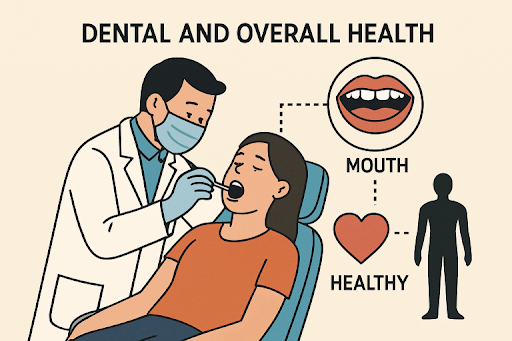The Value of Preventive Dental Care
Scheduling regular dental check-ups is essential for overall health, helping dentists catch problems early, like cavities or gum disease, and avoid invasive treatments. The CDC highlights preventive dental care’s role in reducing complications and improving oral health. Regular visits also address plaque and tartar buildup, which brushing and flossing alone may not manage. This proactive care saves time and offers personalized advice for maintaining a healthy mouth and body.
How Oral Health Affects Physical Health
The links between oral health and overall wellness are well-documented and increasingly recognized by the medical community. Poor dental hygiene impacts more than your mouth—studies show that untreated oral infections and gum disease can raise your risk for systemic illnesses like heart disease, diabetes, and respiratory infections. Chronic inflammation from gum issues may spread via the bloodstream, leading to broader health problems.
Research from Harvard Health highlights emerging evidence of oral-systemic health connections. Maintaining good dental care can significantly support heart health, metabolic function, and immune health.
Routine dental visits and proper oral hygiene practices are essential for dental health and overall well-being, underscoring the benefits of regular dental checkups in preventing complications and supporting long-term wellness. Taking small, consistent steps now can make a big difference in protecting both your smile and your overall health.

Spotting Early Warning Signs During Visits
During routine check-ups, dentists can detect more than cavities, including oral cancer, diabetes, and nutritional deficiencies. They can also identify subtle signs like lesions, unusual mouth sores, and gum discoloration. Early detection is crucial for improving outcomes for severe conditions, such as oral cancer, which can be detected during a routine exam. Symptoms like persistent bad breath or bleeding gums can be related to underlying illnesses, emphasizing the importance of routine dental visits for whole-body health monitoring.
Saving Money Through Preventive Appointments
Taking a preventive approach to dentistry benefits your well-being and saves costs. Regular cleanings, check-ups, and minor treatments are cheaper than emergencies, root canals, or advanced gum disease therapy. The American Dental Association says those who prioritize preventive care are less likely to need costly, invasive procedures. Early intervention also reduces lost work or school time due to pain or complex treatments, adding value to routine dental care. For trusted preventive services, Champaign Dental provides comprehensive care that helps protect your smile while avoiding unnecessary expenses.
Dental Technology Making a Difference
Technological advancements in dentistry have transformed detection and treatment. Digital x-rays use less radiation and produce clearer images, enabling faster, more accurate diagnosis. Laser treatments, 3D imaging, and computer-guided procedures enhance patient comfort and recovery for procedures like fillings and orthodontics. Many dental offices now offer visual demonstrations, helping patients understand their conditions and treatment steps. As technology advances, accessible and minimally invasive dental care continues to improve.
Establishing Healthy Habits Through Education
Routine dental visits offer patient education on brushing, flossing, and dietary choices, which can lead to improved daily habits and reduced risk of plaque buildup, cavities, and gum disease. Public health education emphasizes linking dental appointments with at-home oral hygiene routines, promoting lifelong dental and systemic health, and empowering individuals to take charge of their well-being.
Overcoming Barriers to Regular Dental Care
Dental anxiety, financial concerns, and lack of awareness often prevent people from seeking regular dental care. Addressing these issues with anxiety-reducing techniques, flexible payments, and raising awareness of long-term dental health benefits is crucial. Community programs like mobile clinics, school initiatives, and subsidized care can improve access and outcomes for underserved populations.
Future Perspectives for Dental and General Health
Recognition of the vital link between oral and systemic health drives healthcare innovation and advocacy. Public health initiatives now include dental education in wellness campaigns, and research shows oral hygiene impacts chronic disease management. These efforts aim to make dental check-ups central in future healthcare. Making preventive dental care routine protects your smile and boosts overall health—showing a healthy mouth is key to a healthy body.



